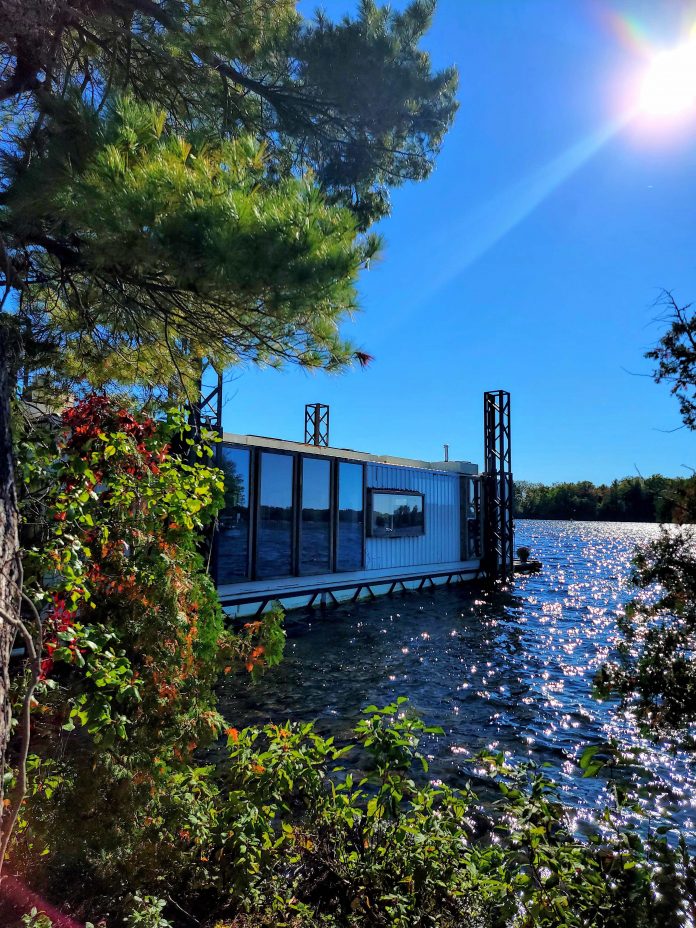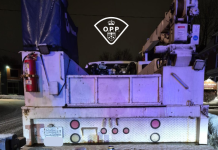Ontario residents have less than two weeks left to submit their thoughts on floating accommodations to the province as tension over the issue continues to bubble up in communities across Ontario.
The Ministry of Northern Development, Mines, Natural Resources and Forestry (MNDMNRF) posted a bulletin on March 3, seeking input from residents on the use of floating accommodations, some of which are made from repurposed shipping containers. Ontario residents have until April 19 to provide their thoughts, which could contribute to possible changes in the regulations. The ministry also invited stakeholder groups to a virtual information session on March 28, aiming to detail the current regulatory framework while also gathering feedback.
“We are seeking input on ideas to inform possible future regulatory amendments related to ‘camping’ on waterways and the use of floating accommodations over Ontario’s public lands,” said the bulletin. “Input from this process will inform consideration of potential future changes intended to address growing concerns around the impacts of this activity on Ontario waterways and those who use them.”
The ministry cites concerns such as wastewater management, the application of building permits, increased human pressures on waterways and more. The Federation Of Ontario Cottagers’ Associations (FOCA) has called the floating accommodations a “blight” on Ontario’s waters as well as “a navigational hazard, a visual scar, and an environmental risk.”
FOCA supports the creation of by-laws prohibiting the floating homes and cottages and is working to coordinate an appeal to Transport Canada to stop designating the structures as vessels. The floating accommodations are already becoming an issue for towns across Ontario. The Township of Georgian Bay released a statement on March 4 stating that, “using a Floating Structure as a dwelling unit is an illegal use per the Township of Georgian Bay Zoning By-law 2014-75.”
The question of enforcement
Though the by-law has existed for years, Mayor Peter Koetsier said the township is still working to determine the right course of action for enforcement. So far, no enforcement actions have been taken, but he said it’s an important conversation for communities beyond Georgian Bay as well.
“It’s a worthy discussion to have on a much wider basis than our municipality because we know more and more people who want to have cottages or boats or get out of the city,” Koetsier said. “One of my biggest concerns is that we’re going to overwhelm the natural environment that we have if we’re not able to exercise limits as to how people are using our natural world.”
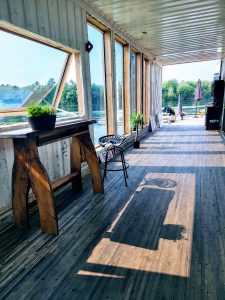
The township is working with the provincial and federal governments to determine what rules exist, if any changes to the regulations are expected, and which level of government will work to enforce the rules. The goal is to find a good and fair resolution as to what should be allowed on Ontario’s waters, he said.
Councils in Tiny Township, Muskoka Lakes and Lake of Bays have started discussions on the matter as well. It’s a province-wide concern, Koetsier said, though many people only became aware of it after a floating home made of shipping containers turned up in Port Severn.
“This container cottage was floated out [on Gloucester Pool] sometime early last summer, if memory serves,” Koetsier said. “I’d say almost immediately the phone calls started coming in.”
People from neighbouring properties started to complain about the appearance of the floating container home, he said. As time went on, residents also expressed concerns about grey water, which is wastewater from sinks, showers and other household appliances excluding toilets, going into the lake.
Building a home and a business
The owner of the floating home is Joe Nimens, who also owns Live Outside The Box, a company dedicated to the creation of floating houses and cottages. He and his girlfriend have been living in a floating container house of his own creation for about a year and a half now.
“It’s just something I’ve wanted to do for most of my life,” Nimens said. “For the last 20 years, I’ve been sort of planning it and finally two years ago, my girlfriend Erin and I decided to stop planning and just go ahead and do it.”
Nimens created his floating container home as a prototype for his business. The goal was to create a four-season vessel that can be lived in full time and that’s able to freeze into the ice. He’s been able to achieve that with his home, he said, and it’s been a chance to learn more and work out any kinks in the process.
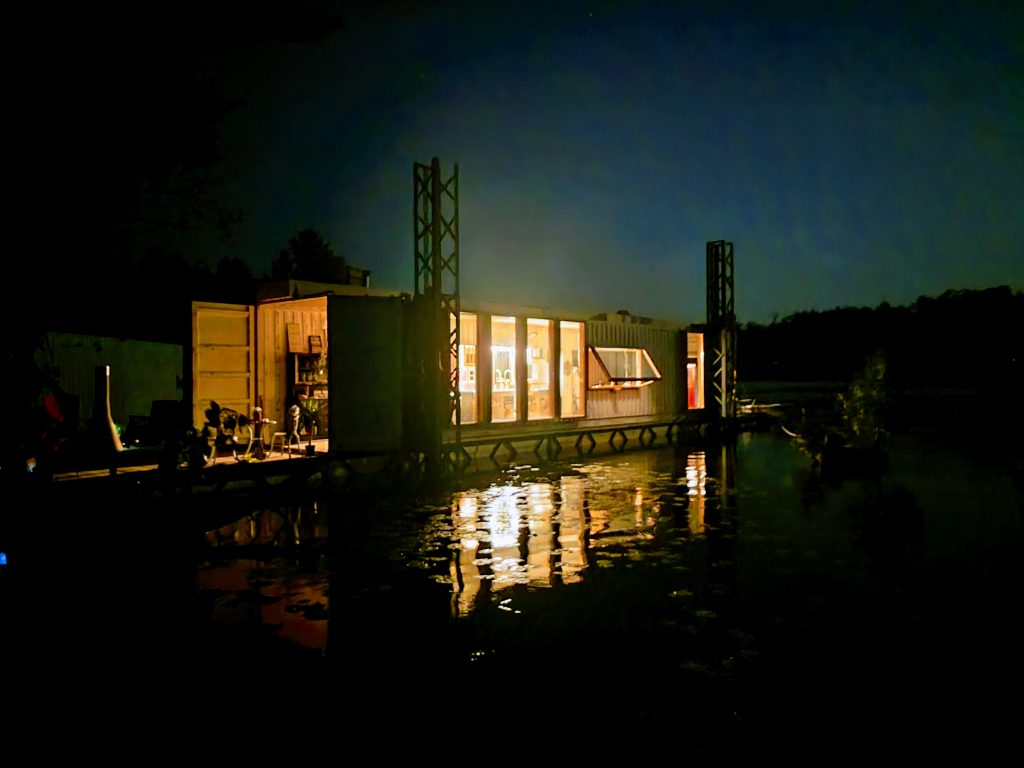
Though Nimens said his floating home is a vessel and not a dwelling, Mayor Koetsier said he believes it can be both, which would mean Nimens’ house goes against the township’s by-law. Nimens insists he isn’t breaking any rules, but Koetsier believes otherwise and urges caution for Nimens and his customers.
“I hope that anybody who purchases from him has a full understanding of the circumstances and potential challenges they may have with their new ‘vessel,’” Koetsier said.
Nimens’ belief in the legality of his floating home lies in Transport Canada’s definition of a vessel. He said the home meets that definition and therefore falls under Transport Canada’s jurisdiction. He hasn’t sold any floating homes or cottages yet as they’re still working to fully finish their first creation, but he’s not concerned about the future of his business.
“Vessels are vessels, and they’ve got nothing to do with municipalities,” Nimens said. “The township can’t change federal law, the province can’t change federal law, and the federal government is pretty unlikely to change rules that govern every boat that comes and goes from Canada.”
Fear of change or cause for concern?
Nimens said he’s listened to all the council discussions regarding the issue and he doesn’t understand why people are so concerned. He admits that it’s not visually appealing in its current state but said he plans to remove some safeguards that they found weren’t necessary, making the vessel look more like a typical houseboat.
Aside from the aesthetic of it, Nimens said they’re not disturbing anyone and even claims that their methods are more environmentally friendly than typical developments on land. He feels their floating houses are the perfect way to enjoy the waterways without disrupting nature or leaving any evidence that they were there in the first place.
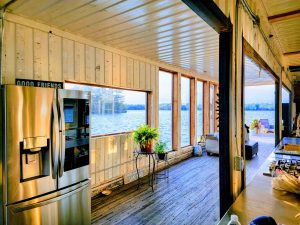
“We didn’t have to cut down any trees. We didn’t have to dig up the ground. We didn’t have to drill any holes into the earth,” Nimens said. “We didn’t have to touch anything, and nobody else with a cottage on Little Lake can say that. They’ve all destroyed a chunk of nature so that they can have their cottage. We came up with a way to enjoy the same lake without destroying anything at all.”
Nimens said he wonders why no one from the township or the provincial government has come and talked to him in person given the concerns that have been raised about his home and business. Despite the many arguments raised by municipalities and other stakeholders, he thinks fear of change is at the core of the issue.
“When people started travelling around the waterways in houseboats 40 years ago, everybody was up in arms about that too,” Nimens said. “But now they’re just part of the scenery, and we’re going to become the same, I think.”
To learn more about submitting input on floating accommodations to the province, visit the Environmental Registry of Ontario website.


